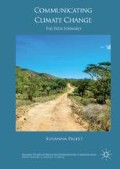Abstract
Even when people accept the existence and causes of climate change, there seems to be little collective will to address it. Human beings are a unique species and we have been successful in overcoming many serious problems confronting us, including some major environmental problems. However, not just political obstacles but important psychological and social barriers seem to have prevented major action on climate in the United States to date. It is difficult for people to accept that the Earth can actually change and become irreversibly less hospitable. Society is not a self-correcting system and powerful interests encourage “skeptical” thinking on the issue of climate. Both our social environment—the perceived “climate” of public opinion—and our changing media system influence our perspectives.
Access this chapter
Tax calculation will be finalised at checkout
Purchases are for personal use only
References
Allgaier, J.2013. On the Shoulders of YouTube: Science in Music Videos. Science Communication 35(2): 266–275.
Bamberg, S., and G. Möser.2007. Twenty Years After Hines, Hungerford, and Tomera: A New Meta-Analysis of Psycho-Social Determinants of Pro-Environmental Behavior. Journal of Environmental Psychology 27(1): 14–25.
Beck, U. 1992. Risk Society: Towards a New Modernity. Sage.
Boykoff, M.T., and J.M. Boykoff.2004. Balance as Bias: Global Warming and the US Prestige Press. Global Environmental Change 14(2): 125–136.
Carey, J. 2011. Storm Warnings: Extreme Weather is a Product of Climate Change. Scientific America, June 28. www.scientificamerican.com/article/extreme-weather-caused-by-climate-change/
Carson, R.1962. Silent Spring. Boston: Houghton Mifflin.
Carvalho, A., and T.R. Peterson.2012. Climate Change Politics: Communication and Public Engagement. Amherst, NY: Cambria Press.
Festinger, L. 1957. A Theory of Cognitive Dissonance. Stanford University Press.
Gandy, O.H.1982. Beyond Agenda Setting: Information Subsidies and Public Policy. Norwood, NJ: Ablex.
Griffin, E. 2008. A First Look at Communication Theory. 7th ed. McGraw-Hill. Also available online at www.afirstlook.com/docs/spiral.pdf
Lorenzoni, I., S. Nicholson-Cole, and L. Whitmarsh.2007. Barriers Perceived to Engaging with Climate Change Among the U.K. Public and Their Policy Implications. Global Environmental Change 17: 445–459.
O’Neill, S., and S. Nicholson-Cole.2009. Fear Won’t Do It”: Promoting Positive Engagement with Climate Change Through Visual and Iconic Representations. Science Communication 30(3): 355–379.
Priest, S., H. Bonfadelli, and M. Rusanen.2003. The “Trust Gap” Hypothesis: Predicting Support for Biotechnology Across National Cultures as a Function of Trust in Actors. Risk Analysis 23(4): 751–766.
Shanahan, J., and M. Morgan. 1999. Television and Its Viewers: Cultivation Theory and Research. Cambridge University Press.
Shanahan, M. 2007. Talking About a Revolution: Climate Change and the Media. International Institute for Environment and Development, December. dlc.dlib.indiana.edu/dlc/bitstream/handle/10535/6263/Talking%20about%20a%20revolution.pdf?sequence=1&is%20allowed=y
Taylor, K., S. Priest, H. Fussell, S. Banning, and K. Campbell.2009. Reading Hurricane Katrina: Information Sources and Decision-Making in Response to a Natural Disaster. Social Epistemology 23(3–4): 361–280.
Yang, J., and L. Kahlor.2013. What, Me Worry? The Role of Affect in Information Seeking and Avoidance. Science Communication 35(2): 189–212.
Author information
Authors and Affiliations
Copyright information
© 2016 The Author(s)
About this chapter
Cite this chapter
Priest, S. (2016). What’s the Rush? Reacting to a Slow-Moving Disaster. In: Communicating Climate Change. Palgrave Studies in Media and Environmental Communication. Palgrave Macmillan, London. https://doi.org/10.1057/978-1-137-58579-0_2
Download citation
DOI: https://doi.org/10.1057/978-1-137-58579-0_2
Published:
Publisher Name: Palgrave Macmillan, London
Print ISBN: 978-1-137-58578-3
Online ISBN: 978-1-137-58579-0
eBook Packages: Literature, Cultural and Media StudiesLiterature, Cultural and Media Studies (R0)

